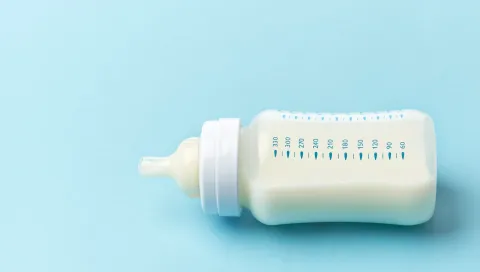When to Stop Baby Formula: A Comprehensive Guide
Babies grow incredibly fast during their first year. One of the many changes parents witness is the dietary shift from formula or breast milk to solid foods and other liquids. If you’ve used baby formula, you might wonder when the ideal time to stop is. This guide provides helpful insights.
Why Formula is Essential for Infants
During the first year of life, babies need specialized nutrition. Breast milk is ideal, but if that’s not available, infant formula is a safe and nutritious alternative. Formula provides the perfect balance of:
1. Providing Complete Nutrition:
- Infants have rapidly developing bodies and brains. They need a specific balance of nutrients for optimal growth and function. Breast milk offers the perfect formula, but for those unable to breastfeed, formula provides a safe and effective alternative.
- Formulated milk is carefully crafted to mimic breast milk as closely as possible. It contains essential macronutrients like carbohydrates, protein, and fats, along with a complete spectrum of vitamins and minerals crucial for:
- Building strong tissues and bones: Protein plays a vital role in building and maintaining muscles, organs, and bones.
- Fueling growth and development: Carbohydrates provide energy for all bodily functions, while fats are essential for brain development and energy storage.
- Supporting immune function: Vitamins and minerals like vitamin C, iron, and zinc are crucial for a healthy immune system, protecting infants from illnesses.
2. Addressing Specific Needs:
- Specialized formulas are available to cater to individual needs. This includes options for premature babies, infants with allergies or intolerances, and those with specific medical conditions. These formulas are fortified with additional nutrients to meet the unique requirements of each situation.
- For instance, premature babies may require formula with higher levels of iron and protein to support their rapid growth and development.
3. Ensuring Proper Hydration:
- Beyond providing essential nutrients, formula also plays a critical role in keeping infants hydrated. This is especially important during the first few months of life when babies are unable to express thirst effectively.
- Formula is formulated with the correct water content to ensure proper hydration and prevent dehydration, which can be detrimental for infants.
4. Supporting Overall Health and Development:
- Proper nutrition in infancy lays the foundation for lifelong health and well-being. When an infant receives adequate nutrients from breast milk or formula, they are better equipped to:
- Fight infections and illnesses due to a stronger immune system.
- Experience optimal cognitive development due to the presence of essential brain-building nutrients.
- Grow and develop physically with strong bones, muscles, and organ systems
The Ideal Time to Transition
Most pediatricians recommend introducing whole cow’s milk to babies around their first birthday and transitioning away from formula during that same time. However, certain factors might make transitioning earlier or slightly later a better choice for your baby.
Reasons to Switch Before 12 Months
While transitioning to whole milk around 1 year old is generally recommended, there are some situations where earlier introduction might be necessary. This requires careful consideration and consultation with your pediatrician. Here’s a deeper dive into these reasons:
1. Formula Intolerance or Allergies:
- Some babies might develop sensitivity or allergies to specific ingredients in formula, such as cow’s milk protein or lactose.
- Symptoms like irritability, gas, vomiting, diarrhea, or rashes could indicate intolerance. If such reactions occur, your pediatrician might suggest switching to a hypoallergenic formula or even transitioning to cow’s milk earlier than 12 months to address the issue.
2. Specific Medical Conditions:
- Certain medical conditions may necessitate earlier introduction of whole milk. For example, infants with iron deficiency anemia might benefit from switching to cow’s milk before 12 months as it’s a good source of iron.
- Similarly, children with malabsorption issues may find whole milk easier to digest than formula in some cases.
3. Prematurity:
- Premature babies often have different nutritional needs compared to full-term babies. They might require fortified formula for a longer duration to support their rapid catch-up growth.
- However, in some cases, your pediatrician might recommend transitioning to whole milk with additional iron fortification before 12 months if they’re demonstrating good growth and development.
4. Maternal Medication:
- If you’re taking certain medications that are not compatible with breastfeeding, your pediatrician might suggest introducing whole milk earlier than 12 months as an alternative source of essential nutrients for your baby.
5. Individual Growth Patterns:
- While not common, some babies might reach developmental milestones earlier than their peers. If your baby is already consistently eating solid foods and demonstrates good weight gain and growth, your pediatrician might consider individualized recommendations for transitioning to whole milk sooner.
Reasons to Continue Past 12 Months
In some cases, continuing formula past the first birthday is beneficial. These reasons could be:
- Picky Eating: If your baby is going through a phase of picky eating and their nutritional needs aren’t fully met through solid foods.
- Specific Health Issues: Some health conditions may require a child to continue formula for a longer duration.
Important Note: Always consult your pediatrician for guidance tailored to your baby’s unique needs.
Signs Your Baby Might Be Ready to Stop Formula
Beyond age considerations, here are signs your baby may be ready to ditch the bottle:
- Meeting Developmental Milestones: Your baby is steadily gaining weight, eating regular solid meals, and shows good overall health and development.
- Decreased Formula Intake: Your baby starts drinking less formula and seems satisfied with solids and other liquids.
- Interest in Cow’s Milk: Your baby shows curiosity and interest when they see you or others consuming whole milk.
Steps for a Smooth Transition
Transitioning from formula to cow’s milk should be gradual and gentle. Here’s how to make it easier:
- Reduce Formula Gradually: Start by replacing one bottle feeding per day with whole milk. Over several days or weeks, gradually replace more and more formula feedings.
- Mix Formula and Milk: You could initially try mixing small amounts of cow’s milk with formula to help your baby get used to the taste.
- Offer Milk at the Right Temperature: Serve milk slightly warm, as it’s most similar to the usual temperature of formula.
- Try Different Cups: Experiment with sippy cups, straw cups, or even open cups to spark your baby’s interest.
Additional Tips
- Don’t Force It: Be patient if your baby shows initial resistance; simply try again a day or two later.
- Stay Hydrated: Ensure your child stays hydrated throughout the transition with water and other approved liquids.
- Monitor for Reactions: Look for any adverse reactions to cow’s milk like digestive issues or rashes.
Frequently Asked Questions
Q: Is whole cow’s milk the only alternative to formula?
A: For most babies, whole cow’s milk is the ideal choice. However, consult your pediatrician if your baby has specific dietary needs. Alternatives may include fortified soy milk or other specialized milk products.
Q: Can I offer low-fat milk instead of whole milk?
A: No. Babies under two need the full fat in whole milk for healthy growth and development.
Q: What if my baby doesn’t like cow’s milk?
A: Continue offering it periodically. It may take some time for your baby to adjust to the taste. If they remain resistant, speak to your pediatrician.
Conclusion
The transition away from formula is a significant milestone in your baby’s development. Remember, every baby is different, so be patient and consult your pediatrician for personalized advice.
